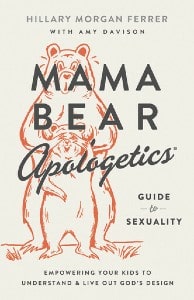Preview:
Amy Davison: And that is one of the keys that I think a lot of kids are missing, especially teens, because think of social media. Social media grooms teens to follow, affirm, retweet because you don’t wanna be seen as bigoted and unfollowed and unfriended. But when we say, “No, when you look at Jesus, you can stand firm in the faith, not compromise truth and still be loving to people.”
End of Preview
John Fuller: Hillary Ferrer and Amy Davison join us today, addressing how you can discuss gender and sexuality with your children. Thanks for joining us. This is Focus on the Family. Your host is Focus president and author Jim Daly, and I’m John Fuller. Uh, as we begin, a note to parents that we’ll be, uh, addressing some mature topics, so you’ll want to direct younger children elsewhere.
Jim Daly: Uh, John, sexuality and gender are two hot-button words in today’s culture, and it seems like everything in the media orbits around everybody’s sexuality. It’s just in our face all the time. And as a parent, it can be so, uh, so difficult to navigate this with your children as they encounter it among their peers at school, their friends, in the neighborhood. Maybe going over to a friend’s house, they’re gonna see and hear things they would never see at your house and then, of course, at church. That’s gonna happen there too. Uh, there are ways to approach this topic with grace and truth to point others to Christ, which is the goal. And, uh, you know, in Christ is where we should ultimately root our identity. In a world where your truth, uh, seems to be glorified, your truth, not the truth, it’s important for us to remember God’s truth, his word. It’s right there. We just need to read it. Uh, John 14:6 says, “I am the way and the truth and the life. No one comes to the Father except through me.” And that’s a good verse to memorize.
Hillary Ferrer: Mm-hmm.
Jim: Uh, you can have confidence that God provides truth and hope, so you can prepare your children to have these conversations when they encounter them.
John: Yeah. And our guests are gonna give us some insight on this topic. Uh, Hillary Ferrer and Amy Davison are two Mama Bears. Uh, Hillary is the founder of Mama Bear Apologetics, which provides accessible, faith-building resources for busy moms, and she’s the chief author and editor for the ministry. Amy Davison joined the Mama Bear team a few years ago, and, uh, she writes about sexual ethics and, uh, God’s purpose in sexuality. And, uh, she’s the co-host of the Mama Bear Podcast. And together, they’ve written a book. It’s called Mama Bear Apologetics Guide to Sexuality: Empowering Your Kids to Understand and Live Out God’s Design. And you can learn more about the book and our guests at focusonthefamily.com/broadcast.
Jim: Hillary and Amy, welcome to the program.
Amy: Thank you so much for having us.
Hillary Ferrer: It’s great to be here with y’all.
Jim: It’s good. Amy, let’s start with you. Uh, y- y- your, I think, daughter, uh, saw a cartoon somewhere and came home and described this. And how did that go down? And what was the cartoon about?
Amy: Uh, so close, it was my son.
Jim: Oh, it was, uh, your son. Okay.
Amy: Um, yeah. No. So it, no, it’ll be hilarious that, that, that everyone confused him for a girl. Um, (laughing) my boy, my younger boys are gonna love that.
Jim: He’ll like that, right?
Amy: Oh, yeah, ’cause he’s got brothers.
Jim: Okay. (laughs)
Amy: Um, yeah. So we, we just arrived in Texas. We’re not native Texans. Um, and one thing we didn’t realize was that Texas summers try very hard to kill you. (laughing)
Jim: Yes.
Amy: So we, we were doing about the only thing we knew how to do to survive the heat, which was stay inside, binge popsicles and Nickelodeon.
Jim: (laughing) Okay.
Amy: And so we had been watching a show on Nickelodeon called The Loud House which is a fairly cute show. It’s about a boy who has 10 sisters, which if, if you have a sister, I mean-
Jim: Yes.
Amy: … you know. And then add 10 of them in a small house.
Jim: That guy had no bathroom time. (laughing)
Amy: Oh my gosh. No bathroom time. No peace and quiet. (laughing) I think he slept in a closet. I mean, it was just a hilarious a show. So, uh, throughout the episode, they’re going up to each one of their crushes and confessing their, you know, their teenage and elementary school love for their crush, uh, to figure out if they were the recipient. And one of the sisters was like, “Well, I don’t know if I can go talk to Sam. I’m, I’m really nervous.” And so her sisters were like, “No. Go ahead. Talk to Sam. It’s gonna be great.” And in every scene where we see the supposed Sam, it was like this ’90s heartthrob of a guy. I mean, he had the plaid shirt. He was deep and brooding. (laughing) He carried a guitar everywhere. (laughing) Like, who does this in middle school? (laughing) And, uh, so you think that’s Sam. And she finally works up the gumption at the end of the episode to write out her, her profession of love and, like all middle schoolers, put it in the locker and run away.
Jim: (laughing)
Amy: And so we see Sam coming up to the locker, and we’re like, “Okay. This is the moment. He’s gonna open it and find the Valentine.” And instead of guitar boy opening the locker, it was the girl that was always in the background right next to him-
Jim: Hmm.
Amy: … that goes up to the locker and open it. And she reads the note, and the sister and her have that googly eye look to each other and then the scene cuts. It was all of two seconds. And my younger two, they were so oblivious playing with Legos, but my oldest, who was 10 at the time, he watched it. And he looks at it, and he looks at me, and he goes, “Wait, Mom. In the episode before, she was crushing on this boy tutor, and now she likes a girl. What is that?”
Jim: Yeah. Here you go.
Amy: And all of a sudden, I had to have a discussion about bisexuality with a 10-year-old, and I was completely unprepared. And I didn’t know what to say. And Christy Tirrell-Corbin, who is the, um… She’s, like, the head of childhood education and early intervention. She said, “Oh, it’s so great when we can get this information to kids at a young age. Because when they’re little, they’re so accepting. It’s only later when they’re taught biases that they learn to adopt these biases.”
Jim: Hmm.
Amy: So if you remove biases and implant Christian worldview-
Hillary: From their parents.
Amy: … from their parents-
Hillary: Mm-hmm.
Jim: Right.
Amy: … they know that parents are not having conversations with their young children. And if they can start speaking, the parents aren’t talking, and they can now evangelize the kid to a secular sexual worldview right under the parent’s noses.
Jim: I mean, you have said so much in that. And, uh, you know, even us having this discussion will make some Christian listeners and maybe even some stations a little uncomfortable.
Amy: Hmm.
Jim: But it’s so critical to have this conversation and encourage parents to engage with their children.
Amy: Yeah.
John: Mm-hmm.
Jim: And I would think most of the introduction is gonna occur just like you described.
Amy: Hmm.
Jim: It’s gonna be some external entertainment, uh, maybe a conversation, but probably a phone-
Amy: Mm-hmm.
Jim: … or a TV show where they’re gonna see this, and then they’re gonna be puzzled-
Amy: Yeah.
Jim: … ’cause now it’s derailed what they were learning was normal.
Hillary: And we crowdsourced this, uh, before we started the book and just asked on the Mama Bear page how many parents had noticed, uh, these themes in their, in their children’s programming, and we had over a 150 comments within an hour.
Amy: An hour.
John: Wow.
Jim: Yeah. All affirming that they had seen something. Yeah.
Amy: The, the, they say which program it is that they seen.
Hillary: All different shows.
Amy: All different shows.
Jim: Yeah. Now here’s, here’s the great truth. God created sexuality.
Amy: Mm-hmm.
Jim: It is a good thing, and he crea- he created a context for it called marriage.
Amy: Mm-hmm.
Hillary: Yeah.
Jim: That’s what the culture’s just destroying. Right?
Amy: Yes.
Jim: That, God’s gift of sexuality in the context of marriage is no longer. That’s, that’s passé.
Amy: It’s oppressive even.
Jim: It’s oppressive. And, uh, I love the fact, uh, Hillary, that you, you reset that and you say, “No. God’s order for sexuality is pure and true and good.”
Amy: Yeah.
John: Hmm.
Jim: You know, these are the things that Paul and, and the disciples were dealing with, practices in the early church-
Amy: Mm-hmm.
Jim: … um, where there was church prostitution-
Amy: Yeah.
Jim: … and they thought that was okay. Uh, eh, so there’s nothing new under the sun with this.
Amy: No.
Jim: It’s just we have this media funnel now that can just wash us over and over and over again with these, uh, situations. Hillary, in the book, you gave a, a fire illustration. I like this. Fire is a great metaphor.
Hillary: Yeah.
Jim: It’s kinda like how Jesus used parables.
Hillary: Yeah.
Jim: Fire is pretty simple. Uh, we understand it as human beings. How do you apply it in this context?
Hillary: Yeah. So a little bit of context for that is one of the things that parents kinda don’t know how to start these conversations with their kids when they’re young. And so I like to affirm to them that kids are creating categories in their heads that they then know where to put things. So we’re gonna create a category that we can later on put sex into. So the category for fire is things that are so powerful that they need to be guarded or things that are powerful enough to create and destroy or things that re good or bad depending on how you use them.
And so all three of those categories are things that sex can fall into. So if you ask a kid is fire good or bad, they’re… You know, some of them might be picturing a candle and will say good, or they’re picturing a cookout. They’ll say good, or maybe they just saw images of a forest fire, and they say, “Ooh, fire is bad.” Well, you show that, no, fire is good and fire is bad depending on whether or not it’s, it is in within proper boundaries and depending on how it’s used. And so now, they have this category-
Jim: Hmm.
Hillary: … of something that actually is kind of value neutral in some ways that depending on the use, um, can, can be good or bad. And so we say, “Well, how, how do we keep this in the good category?” Well, we need to have proper boundaries around it ’cause we have another category, things that are so powerful that they need to be protected. And that’s another place where sex can fall into this category, and you can bring up all sorts of different things. Maybe an untrained giant feral dog that needs to be on a leash. Yeah. He’s so powerful. He needs to be guarded or the nuclear… You know, that the key to the nuclear bomb or whatever, so powerful it needs to be guarded because it can, it can create and it can destroy. Um, and so once they have this category in their head, later on when you start having that conversation, you can say, “Hey, remember those things that we talked about that are-
Jim: Mm-hmm.
Hillary: … so powerful they need to be guarded or so valuable that they need to be guarded. Much like, you know, some of the art, you know, like, we talk about the Mona Lisa.
Jim: Mm-hmm.
Hillary: Remember those things? Well, that is where sex fits in.” Because right now in our culture, kids are seeing sex as, uh, “This is what you do, the very moment you realize you’re attracted to someone.”
Jim: Right.
Hillary: That’s the category that it’s being placed into. Like, even when I was growing up, it was at least things that you do with someone you’re in love with.
Jim: Right. A boundary.
Hillary: Yeah. It’s like there was at least some kind of boundary, and it’s gone from, you know, things that you do with someone you’re married to, to things you do with someone you’re in love with. And now it really is things that you do with someone that you just realize you’re both interested in each other. And we, we really don’t take, um, enough into consideration these categories that these kids are filing things away.
Jim: Hmm. Right. So true.
Hillary: Yeah.
Jim: And then, you know, what’s so amazing is how science catches up with theology.
Hillary: Hmm.
Jim: And what I mean by that, the bonding mechanism that God has put in us.
Hillary: Yes.
Jim: Especially women have this more than men.
Hillary: Uh-huh.
Jim: But that when, when intimacy occurs, there’s this bonding hormone.
Hillary: Yeah. Absolutely.
Jim: You know, “This is my person-”
Hillary: Yep.
Jim: … is what your body is being taught and told by the brain. So it’s kind of fascinating in that degree. Again, God’s design is that you’re gonna get married. You have a sexual relationship, and that person hopefully is bonded to you for life.
Hillary: Mm-hmm.
Jim: And that’s the intimacy that he outlined for us.
Hillary: Yeah.
Jim: But the culture’s totally torn that apart.
John: Hmm.
Jim: Let, let’s get to one of the hot-button issues, uh, gender identity.
Hillary: Yeah.
Jim: I mean, this thing is blown up here at Focus on the Family.
Hillary: Yeah.
Jim: We get so many… And we want you to contact us. But we get so many calls from parents who are struggling with this or grandparents who are struggling with this that their grandchild is coming over, and the adult child is saying, “You know, uh, let Johnny dress up like a girl because we’ve decided he’s kind of gender dysphoric.”
Hillary: Mm-hmm.
Amy: Hmm.
Jim: So this is happening. It’s happening in Christian families, and we get it. And we’re here to help you. We will give you advice, give you resources, even like this book, to help you deal with some of these things. But speak to the gender-identity problem in public schools and what’s happening today. And first, let me say, I mean, we, we always get criticized for being the homophobes, the bigots, the antipeople.
Amy: Mm-hmm.
Jim: It’s not that. It’s just that we know how God has designed us to live as Christians.
Hillary: Yeah.
Jim: And we wanna make sure people at least consider that and the culture consider that before they certainly engage with our children.
Hillary: Yeah. Uh, when it comes to gender, one of the things that Amy and I have talked about is people have turned gender into basically personality or interests.
Jim: Huh?
Hillary: So, um, it’s like to say gender is on a spectrum, no, gender’s not on a spectrum. You have egg producers, and you have sperm producers, and then you maybe sometimes have intersex where you have a biological abnormality. But we don’t define the normal by the abnormalities, and we, and-
Jim: And it’s very rare.
Amy: Yes.
Hillary: Yeah. It’s so rare. And so- some of the ones that are even, uh, defined as intersex really aren’t intersex. Um, I, I’ve, I’ve talked to some Mama Bears where it’s, it’s things where, like, maybe some of the tubes just aren’t, haven’t closed up all the way, uh, and they’re defining that as intersex even though every anything else in the girl is very much a female. And the doctor, actually, right now, will not close up that tube just in case she wants to identify as a male later. So she’s getting bladder infections all the time and all these problems. They won’t fix what’s wrong just in case-
Jim: Huh.
Hillary: … because it’ll make it harder if she wants to transition in the future.
Jim: Yeah.
Amy: Well, and there’s been this twisting of language too because-
Hillary: Yes.
Amy: … I, I mean, Hillary writes extensively on linguistic theft. But sex and gender were, were synonymous.
Hillary: Mm-hmm.
Amy: And, you know, like we’ve, like we’ve discussed, you know, we, we used to define, you know, you’ve got a tomboy or maybe you’ve got a more sensitive, um, boy. Uh, and, and we understood that biological sex, that’s, that’s universal, where you have male and you have female, and then you will have different personality and the different interests. But these do not determine who you are.
Hillary: Hmm.
Jim: Yeah.
Amy: And now that’s com- been completely shifted by gender theory to where now we’re saying, “Okay. No. Your personality is now your gender identity.”
Hillary: Yep.
Amy: And your style, your sense of style is now expression. And this now determines who you are, and your biology is now-
Hillary: Yeah.
Amy: … it’s vilified. It, it’s, it’s on a good level, it’s seen as irrelevant, but at the worst case, it’s seen as a stumbling block-
Hillary: Hmm.
Jim: Yeah.
Amy: … and something that is actually going to hinder you from growth, happiness, success, And i- it’s deeply toxic because now these categories are, are arbitrary, and, and we can now manipulate emotionally-vulnerable children-
Hillary: Yes.
Amy: … into falling into gender theory and conversion therapy, um, having surgeries, and, uh, going on hormones purely because they’re, they’re just trying to, to figure out who they are.
Hillary: Yeah.
Jim: Yeah.
Amy: And whereas, like, when we were kids, like, the big thing is, “Oh, you’re trying to figure out who you are.” Maybe you would dye your hair black-
Hillary: Yeah.
Amy: … or goth or you w- you know, you would join the, the popular kids or that sort of thing.
Hillary: Sometimes I wore camos. Sometimes I wore a dress with sandals. It’s like it was the mood that you were in. And I think if we could have something that we, we keep telling kids, “Gender is not on a spectrum. Interest and personality are on a spectrum.
Amy: Mm-hmm.
Hillary: And these are not the same thing.” And you repeat that over and over again-
Jim: Huh.
Hillary: … until they can imbibe that to where when they hear gender’s on a spectrum, they automatically hear mom and dad’s voice saying, “No, personality and interests are on a spectrum.”
Jim: Yeah. That’s good.
John: This is Focus on the Family with Jim Daly. We’re talking today about how to help your children, uh, navigate this culture. Our guests are Hillary Ferrer and, uh, Amy Davison, and we are so glad that they’re here. They’ve written a book called Mama Bear Apologetics Guide to Sexuality: Empowering Your Kids to Understand and Live Out God’s Design. Reach out to us today for your copy, or as Jim said, if you’re struggling with this in your family and you don’t know where to turn to, uh, we’re a phone call away, 800, the letter A, and the word FAMILY, or stop by focusonthefamily.com/broadcast.
Jim: Uh, hey, we have the right to push back.
Hillary: Mm-hmm.
Jim: And I think not only science, but I think truth and biblical truth certainly is on our side. The way we do it is critical, the tone in which we do it.
John: Hmm.
Jim: One of the first things we have to do is equip our children to be able to recognize these things. So give us some practical ways to teach our children to navigate these conversations with truth and grace at the core.
Amy: Yeah. And absolutely. And that’s it. Right? When we look at how Jesus interacted with unbelievers, I mean, when he was meeting them one-on-one, he never reduced their humanity to their sin.
Hillary: Yeah.
Amy: Like, he never stripped them of their humanity and just hyper focused on their sin. There was wonderful speaker that I heard that she said, “Satan knows your name but calls you by your sin. Jesus knows your sin and calls you by your name.”
Hillary: Hmm. That’s good.
Amy: And when he was interacting with Zacchaeus, the woman at the well, he knew what they were struggling with.
Jim: Right.
Amy: But yet he ate with them. He spoke with them. He had fellowship with them, not to affirm them in their sin, but to reach them with the gospel.
Hillary: Mm-hmm.
Amy: And that is one of the keys that I think a lot of kids are missing, especially teens, because think of social media. Social media grooms teens to follow, affirm, retweet because you don’t wanna be seen as bigoted and unfollowed and unfriended. But when we say, “No, when you look at Jesus, you can stand firm in the faith, not compromise truth, and still be loving to people.” They may not deem it as, as loving. However, loving is truth. It is a vital m- aspect of the nature of God, and it is the only way we can speak truth and love to that individual.
Hillary: Mm-hmm.
Amy: And one of the great ways in doing this, especially with teens and young kids, is really having a worldview approach to sexuality is understanding this is not a materialistic act between bodies. It’s very Darwinian. (laughing)
Jim: Right.
Amy: It’s no, this is actually… Sex is an expression of your entire world view. And, you know, we’ve been giving this talk. I’ve been giving this talk for a year and a half. And every time I do it, whether it’s teens I’m speaking to or adults, I ask them, “You know, what were you told about sex? How many of you were told that sex actually expresses what you believe about reality, God, truth, morality-
Jim: Wow.
Amy: … sin, salvation, th- human history? What are human beings?” I ask them this. I’ve only had four people raise their hands in a year and a half.
Jim: Hmm.
Amy: And I’ve talked to thousands of people. It’s because people don’t know, but that’s exactly what sex is. And that’s why we commanded in scripture to bring up our children in training and instruction. And when they understand the why behind s- God’s design for sex, that is where reverence is nurtured.
Hillary: Mm-hmm.
Amy: Because kids, right? You’ll tell them no. And, or you’ll say, “No. Don’t do that.” And when the make a bee-line.
Amy: … you wanna do the thing. (laughing) However, when you understand, “Wait. Why does God say no? Why does God put kinda boundaries on his design?” And it’s because it is the only, it is within these boundaries that human dignity is affirmed and validated. Once you get out of that design, all sorts of brokenness, oppression, degradation occurs to the human being. It’s only within the Christian worldview of sexuality where you find your humanity affirmed.
Jim: Let me, let me ask you, uh, Amy. You share a list of statistics on another topic, which is insidious in the church to pornography.
Amy: Hmm.
Jim: Speak to the issue of pornography and how we need to guard against that danger. And wh- why is it insidious? Why is it bad?
Amy: Oh my gosh. Well, like we talked about, you know, when you have pornography, it is reducing the individual to an object to be used and consumed and tossed aside. So you are taking, a, a human being with the imago dei imprinted in them and now reducing them and saying, “Your value is determined on what you do for me in the bedroom. And then the second I’m bored, the second you get a little older, the second a couple pounds pack on, now you’re useless to me, and I’m gonna find somebody else.” It really is this consumeristic mindset of the human being that is ultimately degrading. But now, we’ve seen this huge shift within pornography, and now you could get pornography faster than you can get coffee.
Hillary: Yeah.
Jim: Right.
Amy: And there are children, the average age for children, to be exposed to pornography is, is eight, and it’s actually rather high.
Jim: Huh. Wow.
Amy: The majority of children are exposed to pornography prior to the age of 13, and it, it’s intentional. Um, I mean, the, the porn industry, um, the top three porn sites, they do between 5 and 8 billion hits every month.
Hillary: Mm-hmm.
Amy: I mean, this is a 139,000 hits every minute and most often between the hours of 9:00 to 5:00, so even at work we’re seeing this happen.
Jim: Yeah.
Amy: Teens nowadays, young teens, um, between 40% and 60% are consuming pornography regularly, monthly. And they actually see this as, “This is just normal. This is what you do.”
Jim: I mean, uh, this has been heavy. We gotta give the dose of hope.
Amy: Yeah.
Jim: So I wanna run through some questions here-
Amy: Mm-hmm.
Jim: … that kind of lay out what to do. Uh, Hillary, i- it’s important you say to demolish these arguments, not the people.
Hillary: Yes. Mm-hmm.
Jim: We’ve kinda touched on that.
John: Mm-hmm.
Jim: But describe that for me.
Hillary: Um, yeah. So there’s a couple different passages in scripture where it talks about we, we demolish strongholds that, that raise themself against the knowledge of God, but also, we take every thought captive. And so we, you say you’re either taking your thoughts captive, or you’re being taken captive-
Jim: Hmm.
Hillary: … by unhelpful and, uh, uh, and harmful ideologies. And so if we see people more as captives instead of rebels, a lot of times that’s gonna change our approach-
Jim: Right.
Hillary: … uh, to what is going on to see it with the compassion that Jesus had. And, and kinda going off what Amy was saying, how he identified people with their name, not with their sin. I would say I, I’ve met some other ladies who say, “Well, we feel called to be going into the legislature, and to be going into the school boards. How do we do this with love?” And I think this, again, we can get back to Jesus’ model that when he, he’s with individuals, he is so loving so gracious and he, when he sees them where they’re at. When you get Jesus in front of a giant group, he is pretty blunt.
Amy: Yeah.
Hillary: Like, people think that the sermon on the mount is this beautiful passage about, you know, love and tolerance. It’s like, you look at that, it is the greatest smackdown of all smackdowns.
Jim: Hmm.
Hillary: Um, so you are, we are, um, bold and without apology for truth when it comes to the public sphere, and we treat people as captives on the private sphere, knowing that it’s the public sphere that is fostering this way for people to be taken captives. It’s two different, kind of, battle fronts.
Jim: Yeah.
Hillary: Um, one is gonna be more the battle. One’s gonna be more the therapeutic, and we can’t confuse those two. Often, people will take the persons, and they will make that the battle. And then the, when they’re speaking out to the majority in, in public places, they’ll make that the compassion. They’ve got it completely backwards.
Jim: Yeah.
Hillary: And so being able to say that there is a place for, uh, really being able to speak boldly with authority where scripture speaks boldly with-
Jim: Yeah.
Hillary: … with authority and to speak compassionately and quietly and with love, um, when you’re dealing with individuals. If we could keep those two separate, I think we could make a very huge difference in the culture.
Jim: Let me ask perhaps the most important question. I think, you know, even watching Jean, my wife-
Hillary: Hmm.
Jim: … raise our two boys, this was a, a hard area, difficult area for her. It’s kind of the tender area of her heart. It’s where the enemy could throw that dagger into her with the boys.
Hillary: Hmm.
Jim: What are they looking at?
Hillary: Yeah.
Jim: Uh, and so many moms and dads are concerned about that for their sons and now and their daughters-
Hillary: Mm-hmm.
Amy: Yeah.
Jim: … because of the way things are going. So I guess, er, the question I’m thinking of is, er, the issue. It seems overwhelming.
Amy: Hmm.
Jim: Even churches now are dividing-
Amy: Yeah.
Jim: … on this issue of human sexuality and expression.
Amy: Yeah.
Jim: You know, some are saying, “Yeah. It’s okay. And we’ll marry same-sex couples-
Amy: Yeah.
Jim: … and we don’t see a difference, and it’s all about love, and it’s not about judgment.” And, eh, i- uh, this is a big, just a big storm-
Hillary: Yeah.
Amy: Yeah.
Jim: … that seems insurmountable.
Amy: Yeah.
Jim: Like, are we really gonna get through this? It feels like the Christians of Rome.
Amy: Yeah.
Jim: The stuff that they saw-
Amy: Hmm.
Jim: … the way that human life was degraded-
Amy: Yeah.
Jim: … and the gladiator events, killing each other and babies thrown out at the dump-
Hillary: Yeah.
Jim: … because they were unwanted-
Hillary: Yeah.
Jim: … and this out-of-control sexuality, we’re kind of right back there.
Hillary: Yes.
Amy: Hmm.
Jim: So where do we find hope, and how do we trust that God, God knows what we’re going through-
Amy: Yeah.
Hillary: Mm-hmm.
Jim: … that he’s aware and that he’s got a plan and that he’s moving through it?
Amy: Mm-hmm.
Jim: And somehow, how do we find that hope and that diligence to simply teach our kids be faithful and truthful-
John: Mm-hmm.
Jim: … and and be honest with friends and be bold? And, you know, so many leaders right now are saying, “Where are the convictional Christians?”
Hillary: Yes.
Amy: Hmm.
Jim: Where are the people in the public saying, “No. No. No. This isn’t gonna work. This is a dead end.
Hillary: Yeah.
Jim: And humanity has been here before.” What do we do?
Hillary: Yeah. You wanna-
Amy: Yeah.
Jim: Yeah. (laughing) Who wants to go find out?
Hillary: Yeah. I know.
Amy: And it’s, and it’s great ’cause, like, we all have different perspectives. Yeah. One of the things that, that I love, um, uh, Jason Whitlock’s a podcast host, and one thing he says is that, you know, we, we have a spirit of boldness. And when we are, when we are fearful before a holy God, we are fearless before a culture.
Hillary: Hmm.
Amy: So recognizing that God not give us a spirit of meekness, he gave us a spirit of boldness. We also need to recognize that what we’re seeing on the news and the media, it may seem overwhelming, but it’s also just one side. We are fortunate to where we are traveling to churches across the country.
Hillary: Yeah.
Amy: I, I was just in the Dominican Republic, and there are revivals that are going on right now. Parents are passionate, grandparents. The revival of Grand Mama Bears-
Hillary: Oh, it’s awesome. It’s so cool.
Amy: … it is… Oh my gosh, they are a force to be reckoned with. (laughing)
Hillary: Hmm.
Amy: Um, but it’s fantastic because you’re not going to see that on the news, but churches are speaking up and speaking out. So you’re probably not gonna see it on CNN, but it is occurring.
Hillary: Yeah.
Amy: And then one of the ways that Satan is so effective is he makes you feel alone, and he tries to get you to be silent.
John: Hmm.
Amy: Because if he can get parents to be silent, then what it does is it doesn’t remove their children from the battlefield. It removes mom and dad from the battlefield.
Hillary: Yes. Hmm.
Amy: And just like Jesus is right there beside us in the valley of the shadow of death, so we are to model Christ with our children and be right next to them in the battlefield.
Hillary: Yeah.
Amy: And to an extent, the entertainment industry both reflects and cultivates culture.
Jim: Hmm.
Amy: And so parents, Christian parents have bought into this lie. They’re uncomfortable about sex, but know if it’s God’s creation, we speak boldly about it to our kids. We want it to get to the point… Like, we play pause games with my kids-
Hillary: Yeah.
Amy: … to where, well, if something comes across the TV, we’ll pause it and discuss. And we’ve been doing this for several years now to where it’s, it’s hilarious because I’ll pause the TV now, and they’ll go, “Oh my gosh, Mom, we know.” (laughing) And I’m like-
Jim: That’s great.
Amy: “… That’s awesome. What do you know, baby?”
Hillary: That’s right. We say the rolling of the eyes, that’s a sign that you’re doing something great.
Amy: You, you nailed it.
Hillary: Right. You’ve nailed it.
Jim: No. That’s good. And this has been so good, and we’ve run out of time-
Hillary: Oh, no.
Jim: … but, uh, the content’s been so wonderful. And, you know, we can’t cover it all, but thank you for your courage. Thank you for your braveness. I love the, the Mama Bear aspect, the Grandma Bear aspect. My only question is where’s Daddy Bear and Grandpa Bear? (laughing)
Hillary: We keep… Uh, every single thing we come to, they say, “Do you have stuff for Papa Bears?” And like I’d tell them, “You know what? The information in this book is great for Papa Bears too.”
Jim: Yeah.
Hillary: We’ve had some, we’ve had some pastors go through the book from the pulpit saying, “Everybody needs to read this book.” You just gotta make it through a couple of mom jokes, and you’re fine.
Amy: Yeah. They’re fine. These are way better than dad jokes.
Jim: Yeah. But you know, but more seriously, it’s like the school…
Hillary: Oh, yeah. Way better than dad jokes. (laughing)
Jim: But some of it’s like where… At the school board meetings, where are the dads? The moms are there.
Hillary: Yeah. Yes.
Amy: Yes.
Jim: And I’m sure some dads are there, but we need more dads stepping up-
Hillary: Yes, absolutely.
Jim: … saying, “Okay, you’re not gonna molest verbally or visually my child-
Hillary: Mm-hmm. Yeah.
Jim: … in 3rd, 4th grade. It ain’t gonna happen.”
Hillary: Mm-hmm.
Amy: Mm-hmm.
Jim: We need that kinda from both moms and dads. Right?
Hillary: Well, they’ve been quieted by people saying, “This is toxic masculinity and stop mansplaining things to me,” that-
Jim: Yeah. Fair enough.
Hillary: … I think we need to stop listening to the lies that they’re saying and go and be men even if they’re telling you they don’t like what a man is.
John: Hmm.
Jim: That’s so true. Well, great content and, uh, your wonderful book, Mama Bear Apologetics Guide to Sexuality: Empowering Your Kids to Understand and Live Out God’s Design, it doesn’t get any more straightforward than that. (laughing) Thanks for the effort that you had to put into the book, the writing of the book, the talks that you’re giving. I think you’re very brave young women, (laughing) and I think you should just keep on going until you change the whole country. How about that?
Hillary: We’ll do it.
Jim: But let’s, let’s start by getting a copy of the book into your hands. Uh, get a hold of us here at Focus on the Family. And if you can make a gift of any amount either monthly or one time, we’ll give it to you as our way of saying thank you for being part of the ministry.
John: Mm-hmm. Yeah. Donate monthly if you can, or a one-time gift is certainly appreciated. Either way, contact us and, uh, ask for your copy of the book, 800, the letter A, and the word FAMILY, or you can stop by focusonthefamily.com/broadcast for all the details. And plan now to join us next time as we hear from Karen Wingate. She’ll describe how she experienced God in a new way after miraculously gaining her sight.
Preview:
Karen Wingate: Ask yourself, “What am I seeing?” Look for those details. Look for the craggy mountains and the snow caps. And then ask yourself, “What does this tell me about God and his nature?”
John: On behalf of Jim Daly and the entire team, thanks for joining us today for Focus on the Family. I’m John Fuller inviting you back as we once again help you and your family thrive in Christ.
End of Preview




















